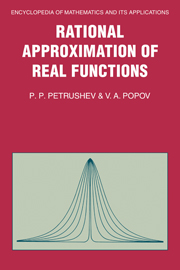Book contents
- Frontmatter
- Contents
- Preface
- Acknowledgements
- 1 Qualitative theory of linear approximation
- 2 Qualitative theory of the best rational approximation
- 3 Some classical results in the linear theory
- 4 Approximation of some important functions
- 5 Uniform approximation of some function classes
- 6 Converse theorems for rational approximation
- 7 Spline approximation and Besov spaces
- 8 Relations between rational and spline approximations
- 9 Approximation with respect to Hausdorff distance
- 10 The o-effect
- 11 Lower bounds
- 12 Padé approximations
- Appendix: Some numerical results
- References
- Author index
- Notation and subject index
3 - Some classical results in the linear theory
Published online by Cambridge University Press: 05 August 2013
- Frontmatter
- Contents
- Preface
- Acknowledgements
- 1 Qualitative theory of linear approximation
- 2 Qualitative theory of the best rational approximation
- 3 Some classical results in the linear theory
- 4 Approximation of some important functions
- 5 Uniform approximation of some function classes
- 6 Converse theorems for rational approximation
- 7 Spline approximation and Besov spaces
- 8 Relations between rational and spline approximations
- 9 Approximation with respect to Hausdorff distance
- 10 The o-effect
- 11 Lower bounds
- 12 Padé approximations
- Appendix: Some numerical results
- References
- Author index
- Notation and subject index
Summary
The most essential question in the quantitative theory of approximation is the connection between the degree of the best approximation to a given function f by means of some tool for approximation (algebraic polynomials, trigonometric polynomials, rational functions, spline functions and others) with respect to a given metric (uniform, Lpand others) and the smoothness properties of f (differentiability, Lipschitz conditions etc.).
The solutions of these questions in linear approximations usually use the moduli of continuity and smoothness. So we shall begin in section 3.1 with some definitions and properties of the moduli of smoothness in C[a, b] and in Lp[a, b]. In section 3.2 and 3.3 we give the classical theorems of Jackson and Bernstein for best trigonometrical Lp approximation. In section 3.4 we consider briefly the best approximation by means of algebraical polynomials in [–1,1] and the singularities connected with them. Finally in section 3.5 we consider the K-functional of J. Peetre, which is the abstract version of the moduli of smoothness, and its application for the characterization of the degree of the best approximation in the abstract case, using abstract Jackson type and Bernstein type theorems.
- Type
- Chapter
- Information
- Rational Approximation of Real Functions , pp. 40 - 72Publisher: Cambridge University PressPrint publication year: 1988



